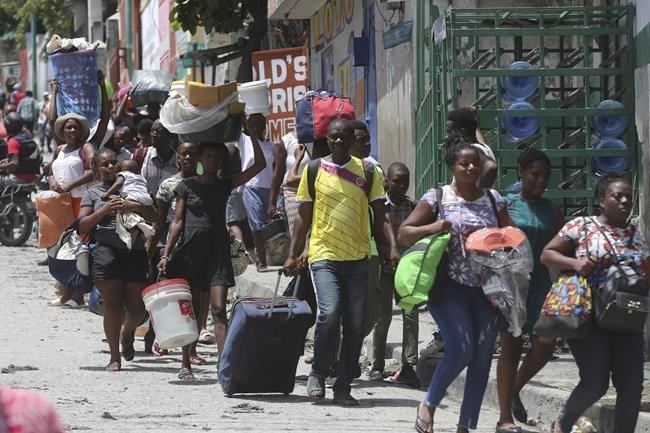
Global Affairs Canada says Ottawa aims to support people in Haiti to prevent sexual violence, ahead of a multinational military intervention in the country. Residents flee their homes to escape clashes between armed gangs in the Carrefour-Feuilles district of Port-au-Prince, Haiti, Tuesday, Aug. 15, 2023. THE CANADIAN PRESS/AP-Odelyn Joseph
Republished October 05, 2023 - 3:06 PM
Original Publication Date October 05, 2023 - 8:11 AM
OTTAWA - Global Affairs Canada says Canada is likely to deploy RCMP officers to Haiti to act as trainers in a multinational military intervention, with officials promising an added focus on preventing sexual violence.
"The RCMP are looking at being focused on technical training," said Lisa Vandehei, the head of an interdepartmental task force on Haiti at Global Affairs Canada.
"Canada's training mission, the planning for it is still underway," she testified at the Senate foreign-affairs committee Thursday.
The United Nations Security Council approved a multinational force Monday to help combat violent gangs in Haiti, which Kenya has offered to lead by January.
Vandehei said Canada is still assessing its contribution to the mission, adding that Kenya is prepared to launch a deployment within 90 days of its parliament ratifying the mission.
She said the RCMP will likely train officers of the Haitian National Police on "very surgical, technical areas" through a model that would have each Canadian-trained officer go on to teach other Haitian peers.
"The RCMP are the best in the world in several areas of policing that the HNP need, in certain elements."
Global Affairs Canada said in a statement that Ottawa is also "focused on preventing sexual and gender-based violence" in Haiti, noting gangs have been using sexual violence as a means of controlling the population.
In past military interventions in Haiti, locals have reported widespread sexual exploitation by both fellow citizens and foreign armies, which Vandehei noted in her testimony.
"We are very much attuned to that, and especially when it comes to sexual and gender-based violence taking place already in Haiti," she said.
"We're looking at working with the Kenyans and the U.S. on ... how to bring our own lessons learned to the table from our (historical) work in Haiti as well."
Vandehei said Canada's aim with the multinational mission is to ensure police have the training and equipment they need to maintain order in Haiti after foreign forces leave, and that the society has the institutions needed for a viable democracy.
"We're going into this issue with open eyes, and it's why we're creating a multi-faceted solution," she said.
After decades of watching Haiti, she said, "I have a lot of hope here."
Haiti's unelected prime minister asked for an international intervention last year, and the idea has been divisive among Haitians, though it is supported by the UN and Washington.
The country has faced a profound security crisis exacerbated by brazen criminal gangs since mid-2021, leading to rampant violence, cholera outbreaks and restricted access to water, food and medical care.
The Liberals have issued sanctions on multiple political and economic elite in Haiti, arguing this will help lead to a consensus among political actors on how other countries can best support Haitians to find stability and eventually hold an election.
Washington had asked Canada to lead a military intervention, but Prime Minister Justin Trudeau said it's unclear whether such a move would lead to long-term stability, citing multiple previous interventions that he argued made Haiti even more dangerous.
Chalmers LaRose, a political-science lecturer with the Université du Québec à Montréal, denounced the looming intervention Thursday as another mistake that will sow more violence and anti-democratic governance in Haiti.
"If all goes ahead as intended, the western community will have won its gamble of becoming involved yet again in an interventionist adventure in Haiti," LaRose told senators, in French.
"We are very far from seeing an inter-Haitian consensus, despite the wishes of external actors."
In recent months, Canada has focused on shoring up the Haitian National Police, the sole official armed force in Haiti, which disbanded its military years ago.
Vandehei shed some light on those efforts, including on a June announcement of the International Security Assistance Co-ordination Group, which has Canada managing how various countries support the HNP.
She said Canada is co-ordinating contributions from "over 26 countries," such as where the equipment offered by foreign countries could be best used in Haiti, whether it responds to local needs and if it's interoperable with existing kit.
Similarly, Canada is helping assemble a training calendar so that foreign police can fill the gaps that Haitian and Canadian officials have identified. She said part of the idea is pulling out cohorts for training in numbers that won't disrupt an already strained police force.
Vandehei noted that there are roughly 9,000 police officers for a nation of more than 11 million people.
Ontario Sen. Gwen Boniface's career focused on transnational policing, including a stint in Haiti, and she said Ottawa could make a meaningful contribution but needs to balance with being short-staffed at home.
"I want to see Canadians on the ground, but I'm trying to figure out how we'd strike a balance," the senator said.
Vandehei added that gangs have become so ingrained in Haiti that they often serve as the effective government and justice system in some areas, despite inflicting "unspeakable violence" on locals.
"We have to be incredibly nuanced in how we're approaching this complexity."
This report by The Canadian Press was first published Oct. 5, 2023.
News from © The Canadian Press, 2023